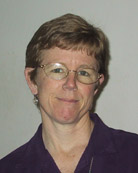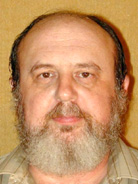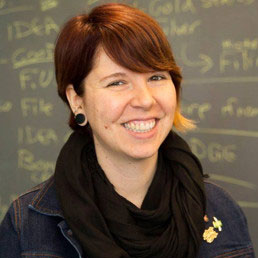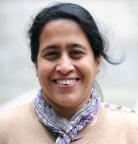-

Deborah Anderson
Debbie Anderson runs the Script Encoding Initiative in the Department of Linguistics at UC Berkeley, which helps get scripts into the Unicode Standard (and ISO/IEC 10646). She is the UC Berkeley representative to the Unicode Consortium and liaison rep to ISO/IEC JTC1/SC2, and is a Unicode Technical Director.
Past speaking engagements:
- Panel speaker, "How the Unicode Consortium Works (and How You Can Get Involved)," (with Rick McGowan, Lisa Moore, and John Emmons), Oct. 2015, IUC, Santa Clara
- "Character encoding in Unicode, transliteration, and the future of multilingual search", June 2015, American Library Association, San Francisco
- "Negotiating the issues of encoding and producing traditional scripts on computers: Working with Unicode" (with Stephen Morey), July 2015, DH2015, Sydney
-

Joe Becker
Joe Becker is one of the founders of the Unicode Standard effort, and an Officer Emeritus of the Unicode Consortium. He has worked on artificial intelligence at BBN and multilingual workstation software at Xerox. He speaks survival-level Chinese, French, German, Japanese, and Russian, and has forgotten Latin.
-

Dr. Martin J. D�rst
Dr. Martin J. D�rst is a Professor in the Department of Integrated Information Technology at Aoyama Gakuin University in Japan. Martin has been one of the main drivers of internationalization and the use of Unicode on the Web and on the Internet. He published the first proposals for domain name Internationalization and composite character normalization, and is the main author of the W3C Character Model and the IRI (Internationalized Resource Identifier) specification. He has also been contributing to the implementation of the Ruby scripting language, mostly in the area of internationalization, since 2007. Martin teaches in Japanese and English, speaks fluent German, can get around in French, and studied Italian, Spanish, Russian, and Latin.
-

Jennifer 8. Lee
Jennifer 8. Lee is one of the founders of Emojination, a small group of activists whose motto is "Emoji for the people, by the people." This global network works to make the emoji approval process an inclusive and representative process. She’ll be sharing her story about how her research on American Chinese food for The Fortune Cookie Chronicles turned into a passion for approval for the dumpling emoji and beyond. It will be a thought-provoking discussion on how this new digital linguistic media is shaping the world around us, as well as the minds of generations to come.
-

Richard Ishida
Richard Ishida, W3C Internationalization Activity Lead, is trying to ensure that people around the world can use the World Wide Web regardless of language, script or culture. The Internationalization Activity works with W3C working groups and liaises with other organizations to help ensure universal access to Web technologies. It also produces educational materials to help people apply international features of those technologies. Richard is on the Unicode Conference board, and the Unicode Editorial Committee.
-

Rick McGowan
Rick McGowan, Vice President, Unicode, Inc. Before joining the staff of the Unicode Consortium full time, Mr. McGowan worked at AT&T, NeXT and Apple Computer as a software engineer, both in the US and Japan. As well as being one of the authors of the Unicode Standard, his varied experience includes fluency in Japanese and 18 years on the Unicode Technical Committee.
-

Megan O'Neill
Megan O’Neill spends her days as the Lead Product Designer on PayPal’s Next Generation Commerce team. This team focuses on developing and launching products for strategic partnerships and emerging opportunities. Her recent work includes leading design efforts for key partnerships with Facebook, Google, Samsung, and Baidu. She also co-authoered emoji proposals for the receipt and flamingo emoji. She currently lives in Silicon Valley with her husband and daughter.
-

Addison Phillips
Addison Phillips is a Principal Engineer and the Internationalization Architect for Amazon.com’s International Technology (InTech) group, where he provides technical leadership for Amazon’s Unicode and internationalization programs. He is the current chair of the W3C Internationalization Working Group and an active participant in the creation of internationalization standards such as Unicode and IETF BCP 47.
-

Roozbeh Pournader
Roozbeh Pournader has been working on internationalization since 1996, when he was in high school. He has contributed to various internationalization standards, is a member of the Unicode Technical and Editorial Committees and has received the Unicode Bulldog Award in 2009. He founded the Persian Wikipedia in 2003.
Since 2011, Roozbeh has worked as an Internationalization Engineer at Google, focusing on text encoding and rendering, fonts, and bidirectional text. He joined the Android Text team in late 2014. He now works as an Internationalization Engineer at WhatsApp.
-

Russ Rolfe
Russ Rolfe is an independent contractor providing project management, internationalization, localization and training services. He worked for Microsoft covering many different responsibilities including Windows 7 World-Readiness Release, Geopolitical and International Application Compatibility management and Globalization Evangelism. He managed the creation of Microsoft's book, "Developing International Software - 2nd. Edition."
He has been involved with Globalization, Internationalization and Localization for over 30 years. He spent a year developing the Internationalization guidelines for AT&T's $10 billion global venture with BT (British Telecom). He spent 12 years with ALPNET (a global Internationalization/Localization company) developing tools and procedures to improve the globalization and localization process. In the early 80's, he also spent five years with Weidner Communications as project manager developing a Japanese to Englishmachine translation system. He was one of founding members of the OSCAR group who created the Translation Memory Exchange (TMX) standard and was a member of the W3Cs International GEO (Guidelines, Education and Outreach) Task Force
-

Alolita Sharma
Alolita wants to see core non-Latin languages fully represented on the Web. She believes the way forward depends on the adoption of open source and open standards like Unicode. Alolita believes the Unicode Consortium serves a vital role in language standardization and bridging the digital divide. She is principal technologist enabling open source at Amazon Web Services. Previously, she headed internationalization, localization and NLP engineering teams at PayPal, Twitter, Wikipedia. She holds multiple degrees in Computer Science and mentors women engineers and advises startups.
-

Tex Texin
Tex Texin has been providing globalization services including architecture, strategy, training, and implementation to the software industry for many years. Tex has created numerous global products, built internationalization development teams, designed best practices, and guided companies in taking business to new regional markets. Tex is also an advocate for internationalization standards in software and on the Web. He is a member the Unicode Consortium and on steering committees for open source software.
Tex is the owner/author of the popular http://www.I18nGuy.com.